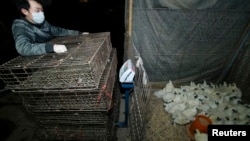SHANGHAI —
Chinese officials have found traces of a new bird flu virus in more areas in Shanghai and in the nearby city of Hangzhou, news reports said on Saturday, as authorities slaughtered birds to stop the spread of the virus that has killed six people.
State-run Xinhua news agency said authorities planned to cull birds at two live poultry markets in Shanghai and another in Hangzhou after samples of the H7N9 virus were detected in birds at the three sites.
More than 20,000 birds have been culled at another Shanghai market where traces of the virus were found this week.
Officials in Shanghai, China's financial hub, ordered all live poultry markets in the city closed on Saturday, leaving food stalls empty.
Authorities also banned all poultry trading in Nanjing, another eastern city, although officials said they had not found any trace of the bird flu virus and chicken on the retail market was safe to eat, official media reported.
The new strain of bird flu has infected 16 people in China, all in the east of the country. Six people have died and the outbreak has spread concern overseas and sparked a sell-off in airline shares in Europe and Hong Kong.
There were no signs of panic in Shanghai, where four of the six deaths have taken place, and people said they were not worried. But the culling, which has been widely publicized, did underline for some how close to home the issue had become.
"Now it's just downstairs,'' said Liu Leting, a user of Weibo, China's version of Twitter which has more than 500 million users. "Suddenly I discover that I'm living in an epidemic zone!''
In one city restaurant, a waitress said they planned to stop serving chicken because of the outbreak.
"After we sell out the chicken in stock, we will not buy new chicken and will stop serving chicken dishes for the time being,'' said the waitress, who declined to be identified.
While the strain does not appear to be transmitted from human to human, authorities in mainland China and Hong Kong said they were taking extra precautions.
Hong Kong's government said it is intensifying surveillance of travelers and poultry coming into the city.
China's Food and Drug Administration said it had fast-tracked approval for intravenous anti-influenza drug Peramivir, developed by U.S. listed biotechnology firm BioCryst Pharmaceuticals Inc.
Peramivir is in medical trials to prove its effectiveness against type-A and type-B influenza, the administration said in a statement. The H7N9 strain belongs to the type-A group.
Shanghai authorities have stressed the H7N9 virus remained sensitive to the drug Tamiflu and those who were diagnosed early could be cured. Tamiflu is made by Roche Holding AG.
China and Hong Kong were badly hit by a 2002-2003 epidemic of Severe Acute Respiratory Syndrome that started in China and killed about one-tenth of the 8,000 it infected worldwide.
State-run Xinhua news agency said authorities planned to cull birds at two live poultry markets in Shanghai and another in Hangzhou after samples of the H7N9 virus were detected in birds at the three sites.
More than 20,000 birds have been culled at another Shanghai market where traces of the virus were found this week.
Officials in Shanghai, China's financial hub, ordered all live poultry markets in the city closed on Saturday, leaving food stalls empty.
Authorities also banned all poultry trading in Nanjing, another eastern city, although officials said they had not found any trace of the bird flu virus and chicken on the retail market was safe to eat, official media reported.
The new strain of bird flu has infected 16 people in China, all in the east of the country. Six people have died and the outbreak has spread concern overseas and sparked a sell-off in airline shares in Europe and Hong Kong.
There were no signs of panic in Shanghai, where four of the six deaths have taken place, and people said they were not worried. But the culling, which has been widely publicized, did underline for some how close to home the issue had become.
"Now it's just downstairs,'' said Liu Leting, a user of Weibo, China's version of Twitter which has more than 500 million users. "Suddenly I discover that I'm living in an epidemic zone!''
In one city restaurant, a waitress said they planned to stop serving chicken because of the outbreak.
"After we sell out the chicken in stock, we will not buy new chicken and will stop serving chicken dishes for the time being,'' said the waitress, who declined to be identified.
While the strain does not appear to be transmitted from human to human, authorities in mainland China and Hong Kong said they were taking extra precautions.
Hong Kong's government said it is intensifying surveillance of travelers and poultry coming into the city.
China's Food and Drug Administration said it had fast-tracked approval for intravenous anti-influenza drug Peramivir, developed by U.S. listed biotechnology firm BioCryst Pharmaceuticals Inc.
Peramivir is in medical trials to prove its effectiveness against type-A and type-B influenza, the administration said in a statement. The H7N9 strain belongs to the type-A group.
Shanghai authorities have stressed the H7N9 virus remained sensitive to the drug Tamiflu and those who were diagnosed early could be cured. Tamiflu is made by Roche Holding AG.
China and Hong Kong were badly hit by a 2002-2003 epidemic of Severe Acute Respiratory Syndrome that started in China and killed about one-tenth of the 8,000 it infected worldwide.









